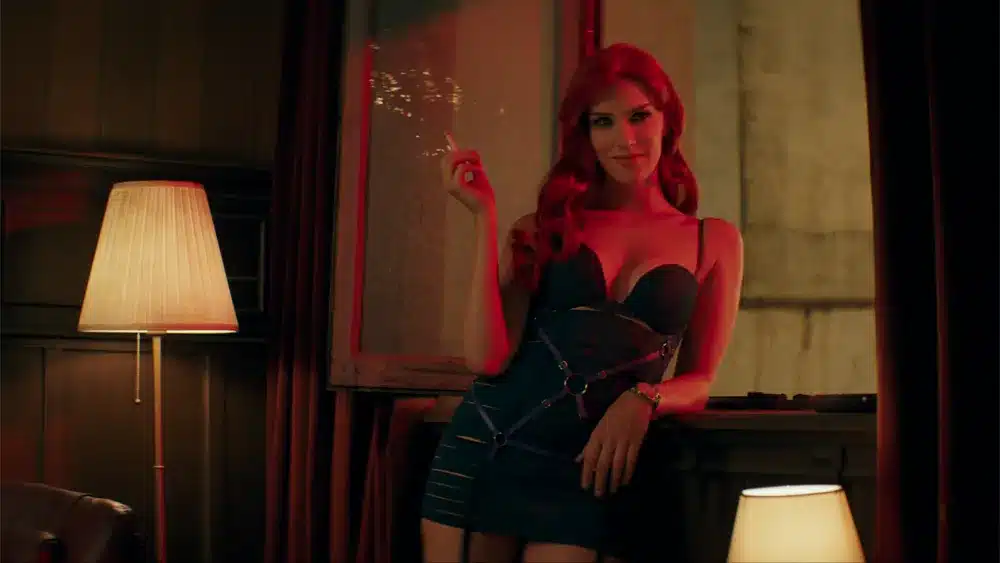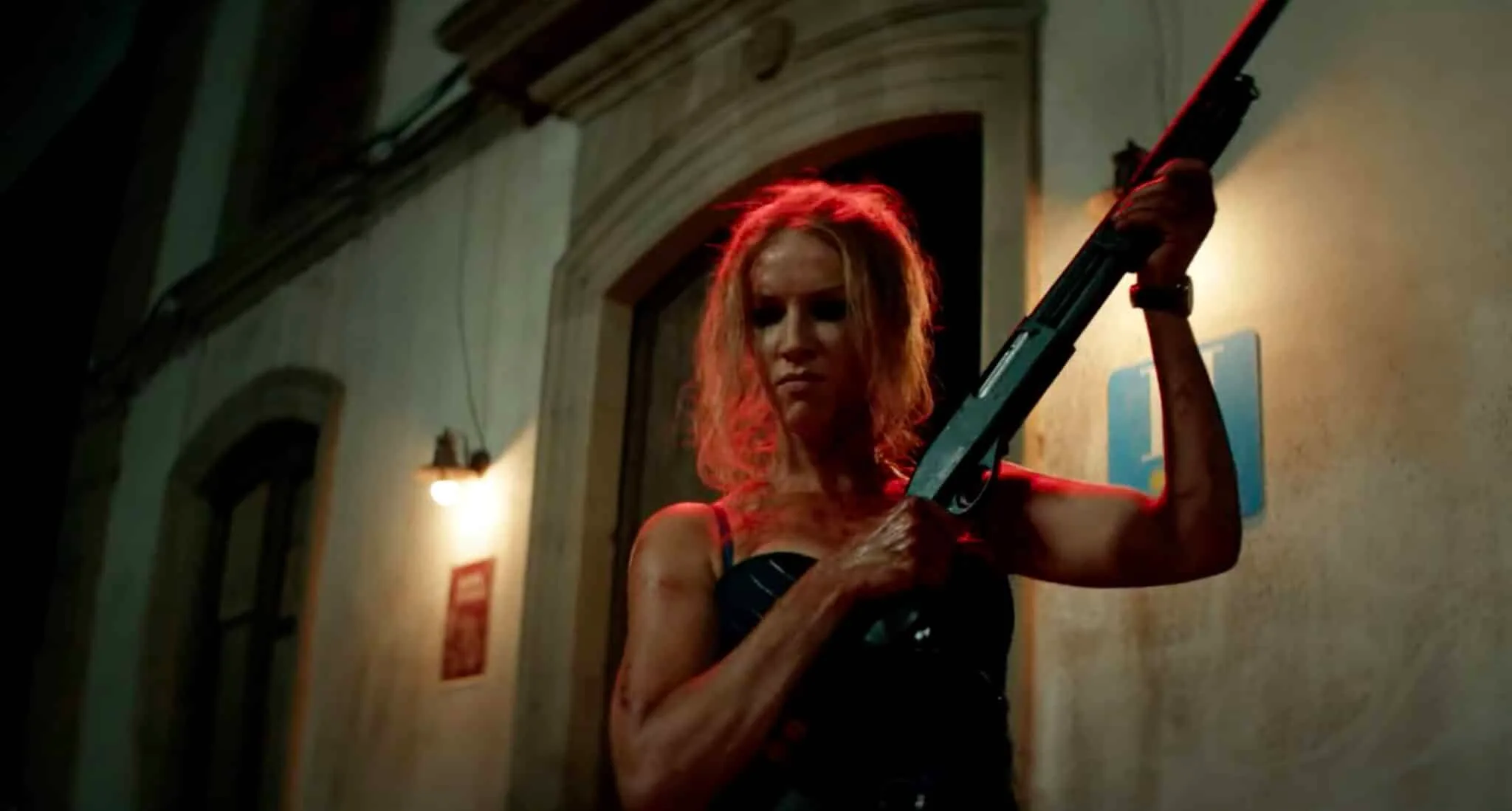
Before getting into this review of Duchess (2024), I’d like to draw attention to the film’s poster art. Tell you what, let’s have a look at it now.

Does that look right to you?
The proportions are all off; at first glance it looks passable, but then perhaps something catches your eye and you notice that a woman’s shoulder can’t be there, far less her bust. Her arms can’t be there either. The poster makes no sense, but it does all it needs to do: it showcases Charlotte Kirk, showing that this project is all about her. As such, the poster’s honest, even if it’s totally warped and in dire need of sorting out. It functions nicely as a microcosm for the film itself: it doesn’t sit right, it doesn’t bear close examination, but it’ll do.
The film begins as no doubt the entire project began: with an idea about getting Kirk in lingerie, and then some notion of filling in around that with a story. She’s in lingerie because she has somehow set up a honey trap for a gangster type who has wronged her; the use of a voiceover and freeze frames (as per Guy Ritchie) tell is that this is payback. We then zip back in time to examine how we got to this point, and what it’s payback for: again as per Guy Ritchie, we begin with the film’s habit of displaying a large number of character names on screen, but because we have barely anything to do with most of these people, you will forget them. Turns out that Scarlett starts out as a pickpocket working in nightclubs (though wearing the sorts of slinky dresses which presumably make it very hard to conceal what you’ve stolen) – whilst doing this, she’s spotted by a charming American called Rob (Philip Winchester) and there’s a big manly fight over Scarlett, because of course! Rob takes a shine to her and tracks her down to her boxing club (!) where she breaks off from a practice to dismiss him utterly. Some time passes, but he persists, rescuing her shortly after a vicious beating at the hands of the boyfriend from the club which, as is now traditional, apparently breaks her bones, but leaves her with nothing more disfiguring than a few dabs of blood on her face, and broken ribs which magically heal just prior to getting shagged by Rob, otherwise all that getting slammed against a wardrobe door would really hurt.
So they fall in love: it turns out he’s a diamond dealer (albeit one who is under the impression that people mine them from ditches) and, as the diamond trade is full of wrong ‘uns, some stuff goes down, including a cameo from Stephanie Beacham as a gangland doyenne, who has been tasked with the most awkward swearing ever committed to film. It’s slow, slow, slow, but we get to the point where plenty of double dealing takes place, Scarlett gets the exorbitant nickname ‘Duchess’ (though at least she doesn’t pick it herself, as it has that ring to it) and then eventually it all turns into a vengeance epic, with ‘Duchess’ aiming to set up on her own.
Never certain if it’s sending itself up or pushing the envelope in terms of gritty crime fare, Duchess fluctuates between the two until the last half an hour or so, when it finally opts for the latter. To give it some credit, it’s not a bad looking film at all: there’s money coming from somewhere, regardless of the audience responses to Marshall-Kirk projects to date, and this means a budget for locations, interiors, lighting, framing and the incidental music, which does a reasonable job of weaving things together. Sean Pertwee, though cast very much in a supporting role, is a welcome addition, and though Beacham is given short shrift from the script, it’s always good to see her.
But once again, Neil Marshall and Charlotte Kirk have taken it upon themselves to write the script together, and once again, it’s disastrous. Is it as bad as The Lair (2022)? Well, we’re not taking any ridiculous shortcuts like announcing the lead character has a photographic memory in order to justify an equally ridiculous plot point, but nonetheless we’re stuck with the same casual biases, logical gaps, weird puffery, childish ideas, non-sequiturs and as mentioned above, amateur swearing. The swearing is an important point, actually: it’s a bit like asking someone if they know the price of a pint of milk to find out whether they understand what life is like for most people. Don’t know where and how someone would swear in a sentence? Then leave it out: get it wrong and it’s a massive shibboleth which gives you away as immensely naïve and out of touch, which is bad news when you’re trying to spin a yarn about gang warfare. Equally, purloining so many elements from Guy Ritchie is an error not just because it’s lazy, but because the cockney accent and dialect used by his characters in the 90s is on its way out now: someone born in 1995, as ‘Duchess’ is, would in all likelihood be using MLE, or Estuary. Attention to detail.
But the accent thing…that’s one thing. The real problem with this film is its treatment of Kirk. It’s that which really marks it out as a thinly-plotted game of Dolly Dress Up, and endless yammering about whether or not Duchess has ‘balls’, or needs ‘balls’, or can kick men in the balls, doesn’t create the gloss of feminism which the film apparently believes it does. In fact, let’s go further: the strong and uncomfortable sense that these films begin with storyboards of Kirk in various sexy outfits, which are then used as the basis for stringing the outfits together with a plot. That is the cardinal sin of the film. How a once-renowned director like Neil Marshall could be so wrapped up in his personal life as to traduce his own reputation like this is bizarre, and who knows? One day, it might all feel like a bizarre fever dream. It’s actually heartening to see that Kirk is working with other directors and other writers on upcoming projects at the moment: I hope they can bear to push her a bit more, because as much as she has benefitted by being elevated to leading lady status by dint of her relationship status, she may have reached the top of that learning curve. And she’s no script writer, but the blame is not hers alone, is it?
Duchess (2024) is yet another exercise in frustration, a film with money and means which nonetheless scuppers all potential with its daft decision-making and blinkered priorities. Same as the historical horror, same as the sci-fi, and now a crime movie. How long can this go on? Realistically? Do audiences matter? Who are these films even for?
Duchess (2024) was released on August 9th 2024.
